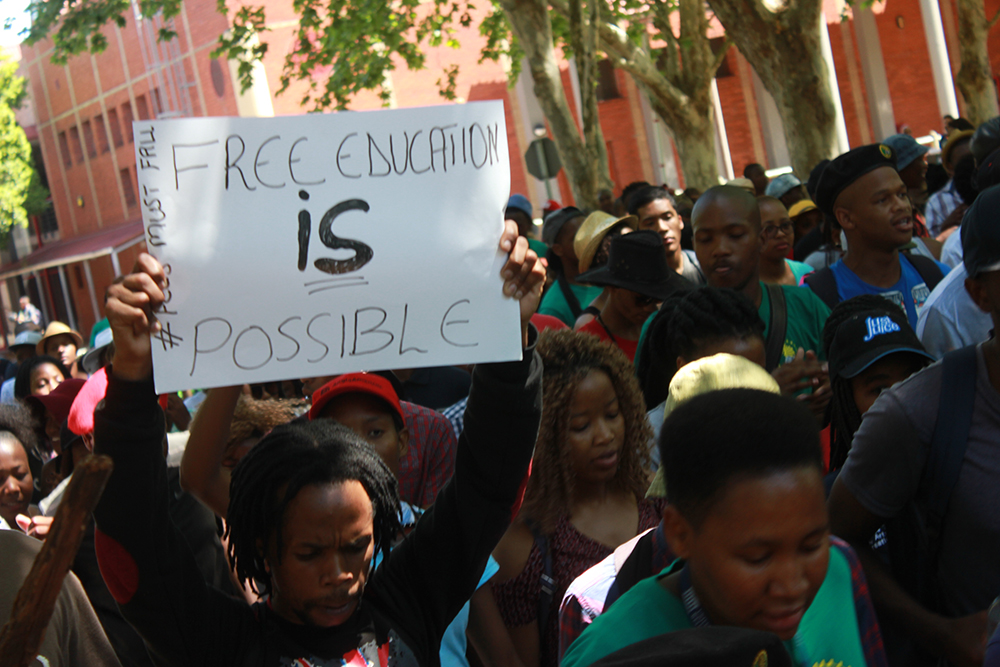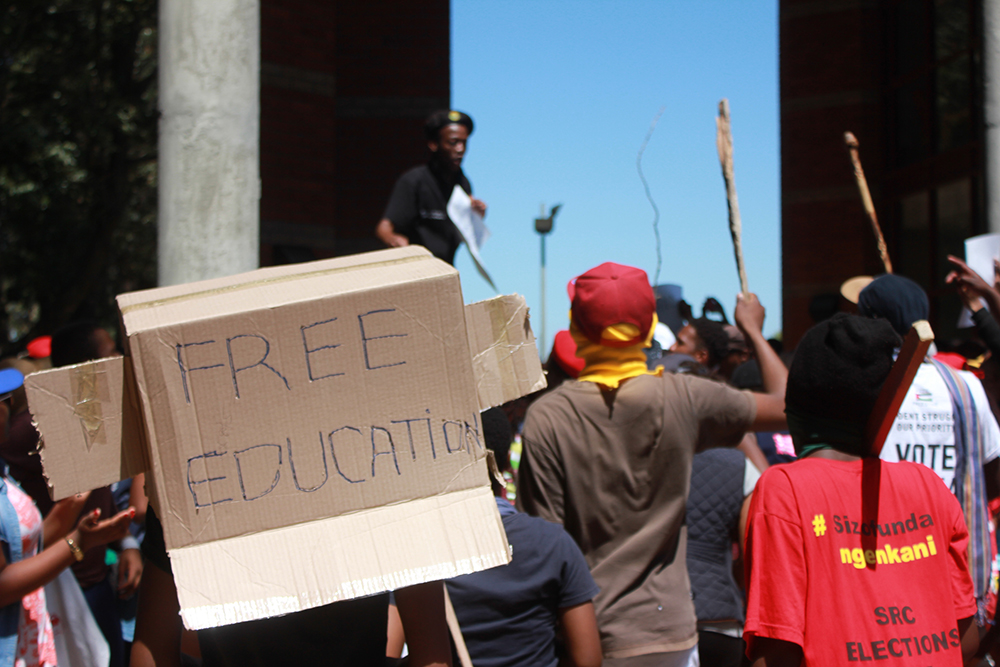The University of the Western Cape (UWC) remains shut down, with the university’s management and students caught in a deadlock. The student body is currently divided by those wanting to continue protesting, as management has failed to meet their demands, and those wanting to commence with exams. The atmosphere at the university has been described as “tense†due to the reported continued presence of private security personnel, ambulances, and the South African Police Service (SAPS). AMANDA XULU updates us on the last week at UWC.
Monday, 26 October
A mass meeting was held to discuss the potential factionalism caused by the influence of politically-affiliated organisations. The role of bodies like PASMA, ALUTA, EFF, DASO and SASCO were highlighted as a particular problem, and it was argued by many that party politics threatened to undermine the previously non-partisan nature of the #UWCFeesMustFall movement.
Following the march to Parliament on 21 October, SASCO members were advised to distance themselves from the protest, which seems to have been the case throughout the country. The role of the UWC Student Representative Council (SRC) was also discussed. The SRC had at this stage distanced themselves from the movement, having argued against continuing the protests, and calling for students to return to campus and let the exam process begin. At a plenary meeting on Monday evening, it was agreed that the students would carry on protesting the next day because university management – and vice-chancellor Tyrone Pretorius in particular – had failed to address the demands of the students.
Tuesday, 27 October
The students’ protest successfully shut down campus and the police were called in by management to “ensure calmâ€. At this stage, it was reported that the police had been relatively peaceful. The name of the movement was changed from #UWCFeesMustFall to #UWCFeesWillFall. Students argued that the former name did not capture the urgency of their demands, while the latter was a clear indication of their will to successfully fight UWC for no fee increments. Vice-chancellor Pretorius had at this stage had still not addressed the student body in person, but was instead addressing them through emails and the SRC.
Wednesday, 28 October
According to #UWCFeesWillFall spokesperson Kaizer Festile, a memorandum of understanding was drafted by the movement to hand over to the University. The demands included matters concerning historical debt, fee increments and the institutionalisation of a residence off-campus, which had been built three years ago, yet housed no UWC students.
Vice-chancellor Pretorius stated that the university would respond to the students’ demands by Friday, and urged the students to let normal university activities resume. Pretorius apparently also met with the university’s executive to discuss the way forward. At a plenary meeting at the Student Centre (the base of the movement), it was agreed that students would carry on protesting the next day.
Thursday, 29 October
A staff meeting was held, with Pretorius expressing the need for normal activities to resume on Monday, 2 November. UWC students again shut down campus, and occupied Robert Sobukwe Road in protest against the university’s continued lack of engagement with their demands. This was the first reported day of not only police presence on campus, but of private security personnel apparently hired by vice-chancellor Pretorius to “protect students and staff that did not feel safeâ€.
Calls of violence and intimidation by protestors were reported, with many fearful first years being evacuated for their safety to off-campus accommodation. Residences are also said to have shut down on Thursday, with many students sleeping in the Student Centre, as they were barred from entering their residences by “men in blackâ€.
According to students, Yamalisa Mdoda and Linda Ntshangase, the presence of four ambulances, the SAPS, private security personnel, and the riot squad, made campus a “vulnerable†place. These enforcement groups were noted for their aggressive refusal to let students enter their residences.
Friday, 30 October
Pretorius was apparently set to meet with the student body following the drafting of a memorandum of understanding by #UWCFeesWillFall grouping on Wednesday. However, Pretorius did not respond to nor meet with the students. Tensions between protestors and various law enforcement agencies resulted in violent outcomes.
As protestors moved from residence to residence, with the intention of mobilising students, violence ensued; for example, students were aggressively barred from entering and leaving Dos Santos Residence. It has been reported that the “men in black†–presumably private security personnel – started dragging, pulling and strangling protestors trying to enter the residence.
Students responded with violence, arming themselves with stones and fire extinguishers against the pepper spray, tasers, stun grenades, teargas and rubber bullets employed by the police and private security personnel. According to students, a group of protestors forced some students from their rooms by dousing the rooms with a fire extinguisher.
After marching to the Student Centre, violence escalated as some protesters started damaged the administration building with the intention of finding Pretorius, who was reportedly in a meeting with the SRC, who had long distanced themselves from the movement.
It was reported that the CPS building and the School of Government were also damaged, with reports of broken windows and doors. Yamalisa Mdoda, a UWC student, says students’ eventual violent retaliation against the “men in black†was the work of weeks of frustration due to their peaceful protest methods having being met by silence and violence from the university, with no clear resolution in sight.
It was reported that after the damage to different buildings, the riot unit and the police came onto campus, attempting to trap protestors inside the Student Centre. This failed as the students used fire extinguishers to protect themselves and fight back against the use of stun grenades and teargas. Three private security personnel were reportedly injured during this scuffle and taken to hospital. The most serious reported injuries amongst students include two broken legs and a broken arm.
Following the escalating violence of Friday, UWC’s chancellor, archbishop Thabo Makgoba, along with the Western Cape Council of Churches and the Western Cape Director of Justice came to show support for the students, and urged university management to address the concerns laid out in the memorandum of understanding. Makgoba also urged students to go back to regular university activities so that they could write exams.
In an email addressing the student body on Friday, Pretorius admitted that he had received calls from both staff members and students to meet with protesting students so that a resolution could be reached but would not be doing so as “to do this would be to betray everything that we claim to stand for as an institution of higher education†as the “violence, intimidation and destruction of property were used to underscore their demands, it would be unthinkable that we could be forced into acceding to their demand to be heardâ€.
Saturday, 31 October
Saturday was a day of relative calm, despite the heavy presence of private security personnel and police. It was also reported that students were allowed back into their residences, but were still being monitored by private security.
Sunday, 1 November
A plenary meeting was held to discuss the way forward for the week, following an email from Pretorius about resuming all university activities on Monday, 2 November. Pretorius, in his email to the student body, said that there will be security and police presence “in the interest of the safety of students and staffâ€, and that access to campus would only be for UWC students and staff.
Pretorius also pledged to hold another staff meeting at 13h00 on Monday, 2 November, but has not yet made any plans to address the student body personally. Pretorius also met with the SRC executive and university management at the Crystal Towers Hotel to discuss a suitable way forward. It was reported that none of the student-recognised leadership groups were represented.
Following a prayer service held at the Student Centre, it was decided by the movement and protestors that they would continue to shut down the campus, and would ensure that regular operations would not continue until Pretorius had directly addressed students, along with their demands.
A campus clean-up under the name “Reclaim UWC†was scheduled for 9am on Monday, with concerned students wanting to, “clean up the vandalism and destruction left in the wake of the protestsâ€.

![UWC fees will fall protestors with banner [raeesa pather] [SLIDER]](https://www.thedailyvox.co.za/wp-content/uploads/2015/11/UWC-fees-will-fall-protestors-with-banner-raeesa-pather-e1446454986536.jpg)









